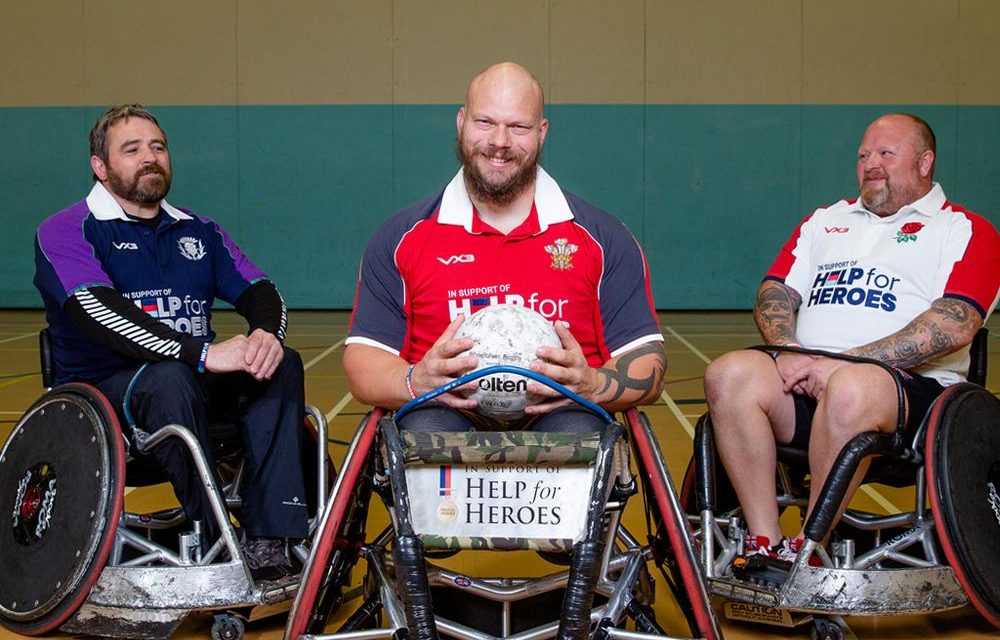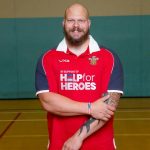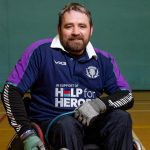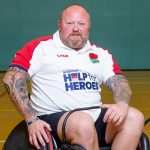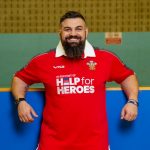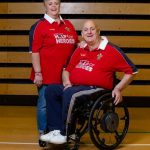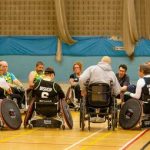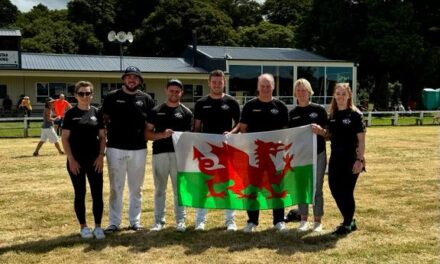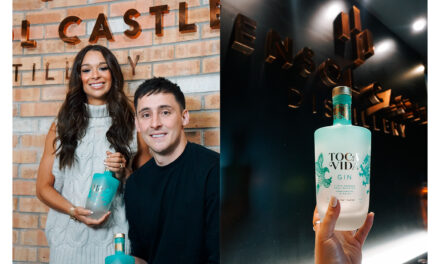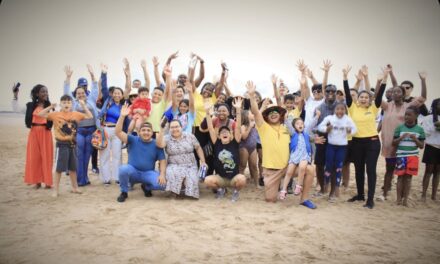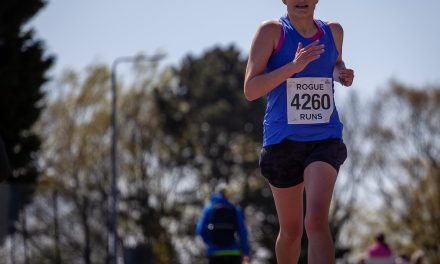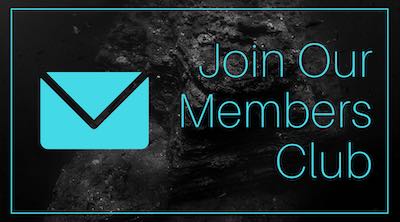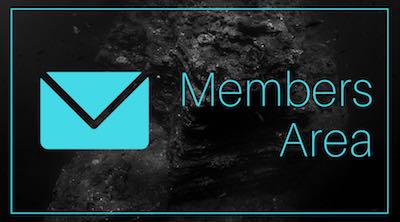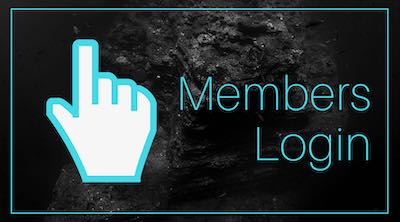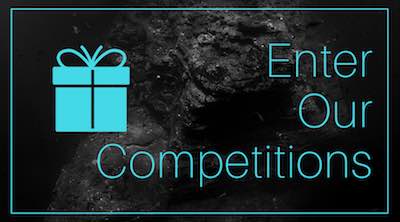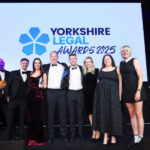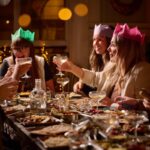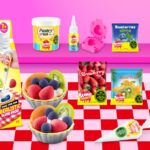The veterans whose lives were changed forever by injury, brought together by their passion for rugby, inspiring others to give support
With the 2020 Six Nations Championship well and truly underway, the eyes of the sporting world are firmly fixed on what promises to be a captivating competition once more. There’s always been a close affinity between the military and rugby communities, and supporters of Help for Heroes can wear that support with pride, as the charity showcases its rugby clothing range, modelled by veterans from Wales whose lives have been improved thanks to the charity’s recovery activities, who are united in their love of wheelchair rugby.
With more than 30 years’ military service between them, veterans Bruce Falkenberg, Jim Whitworth and David Dewar have had to fight back from serious life-changing injuries, which left them all seeking a new direction. The three came to Help for Heroes for support when they needed it and were guided to sport to aid their recovery.
They were introduced to wheelchair rugby through Help for Heroes’ Sports and Community Recovery programmes, and now take part in weekly sessions with the Ospreys wheelchair team in Merthyr Tydfil. The mixed ability squad is made up of ex-military and civilian members, who have a range of physical challenges to overcome. Led by former Welsh Guard Paul Jenkins, the team is a fantastic example of the spirit of camaraderie familiar to those who’ve been part of the armed forces community.
Originally from Zimbabwe, Bruce Falkenberg joined the Royal Regiment of Wales in 2000, beginning his service in Germany. After injuries and a series of operations, he found himself being rehabilitated at Headley Court – with no real direction in life. Medically discharged, and living in Wales, it was only after attending Help for Heroes’ Community Recovery support hubs that Bruce saw a path ahead in the form of wheelchair rugby. Bruce says, “I turned up to a session, found that I was actually okay at it. I thoroughly enjoyed myself, being part of a team again. I was grant-funded a wheelchair by Help for Heroes and Blesma, which has really given me a whole different dynamic, you know. It really opened-up the sport for me”.
Thoroughly immersing himself in sport led Bruce to attend the UK Invictus Trials in Bath last year. “It was a fantastic opportunity to see so many variations of sport; people from all walks of life, both serving and veterans; by the end of it everyone had a beaming smile on their face, blisters on their hands, but everyone thoroughly enjoyed it”.
Bruce has noticed positive changes in his life over the last twelve months. “I think just being around people again of the like mind, I’ve grown, both mentally and physically, being able to relate to people and talk to people. I’ve always had the ability to talk to people you know, but being part of that close-knit group, it’s like family’’.
He says attending Help for Heroes support hubs is fantastic for veterans and their loved ones, “Everyone’s happy to see you, everyone’s got their own problems you know, they’re going through all sorts of things, but it seems like when you walk in that door everyone’s having a cup of tea, a cup of coffee, a bit of a cake, a bit of a laugh and just for a couple of hours, nothing else seems to matter”. Bruce has become a familiar face at the charity’s monthly fellowship hub which runs at Nuffield Health in Bridgend, regularly bringing along his parents, and often a very welcome home-made cake, baked by his mum.
Having served in a Welsh regiment, settled in Wales, and married Louise who is a proud Welsh woman, Bruce is delighted to model the nation’s new Help for Heroes rugby shirt. Bruce says, “It’s a great honour to be able to represent Wales and the charity which has done so much for our family. I feel proud knowing that I wear it and I’m flying the flag for the British army.”
Scotsman David Dewar served for 16 and a half years in the Army, before a spinal injury left him unable to continue his military career.
As a keen sportsman, David was always interested in keeping fit, pushing boundaries and staying competitive. After approaching Help for Heroes for support he said, “I’ve never looked back. The support they’ve given me has been fantastic and it still carries on to this day. Without Help for Heroes, I wouldn’t have been able to participate in my sports as I am now, to a good level, which I’m happy with’’.
2018 saw David take part in the UK Invictus Trials where he took part in a range of sports, and found his favourite, wheelchair rugby. He says a combination of sport and medication helps him manage his pain and enables him to train with the Ospreys Wheelchair Rugby Team. David says, “I think for me, my main sport has to be wheelchair rugby. I enjoy it so much. I like coming and training with the guys. We’ve all got various illnesses or injuries, but we all get along. I go away with a good smile”.
After a challenging time, David is feeling positive again, thanks to sport. He’s due to represent Team UK playing wheelchair rugby at the 2020 Invictus Games in the Hague and says, “At the moment I feel that I’m in a better place, and I’m really happy and I’m really proud today to wear the Scottish top for Help for Heroes”.
For Englishman Jim Whitworth, the rugby training sessions provide an opportunity to forget about the physical and psychological challenges he faces as a result of his service. He says, “The 4 hours we train here there’s nothing else in my mind. It takes me to a different place, I am focused on the game, the playing, my training and everything else and that’s what’s good for all of us”.
Jim served as a Warrant Officer in 26 Regiment in the Royal Artillery, leaving the service in 2011 after being medically discharged due to spinal problems. After going through a range of support programmes Jim got in touch with Sports Recovery at Help for Heroes, where he seized the opportunity to represent the UK in the US Airforce Trials in Las Vegas. According to Jim, “Sports Recovery introduced me back into the fold of looking after yourself, new sports, giving you that ethos back and it puts you around like-minded people as well, that have all served, or have similar interests”.
Although sport plays a big part in Jim’s life, he’s also engaged with the holistic support Help for Heroes provides through their Community Recovery team. Taking part in the Pathfinder Experience at the charity’s Welsh base in Treforest, Jim says there were, “a fair few lightbulb moments. It really grounds you to understand who you are a little bit more and what makes you tick. It’s been a real eye opener and a real help.”
Jim wants to encourage others to come forward for support when they need it, adding, “There is help out there, that you can get involved in. For me, it’s a massive privilege and it’s an honour to share my story of how I’ve been helped by Help for Heroes”.
To have been chosen to represent England and model the Help for Heroes clothing range, including his country’s rugby shirt, was an opportunity Jim couldn’t resist, “I am so proud to wear this shirt and it really is lovely, I think everyone should get one!’’ he laughs.
For Jim, the Help for Heroes’ experience is all about community. “I know it sounds a bit cheesy, but they’re your brothers, aren’t they? We all come from different backgrounds, different cap badges, a different cause, we’ve all had different journeys, we’ve all got different injuries, but the one thing we all have in common is that we have served, and we get each other’’.
As a child, Darren Carew dreamt of joining the army and becoming a rugby player. His dreams were realised after he signed up for the Royal Welsh Regiment in 1998. Darren recalls, “Going into the Royal Regiment of Wales gave me an opportunity to be a soldier and a rugby player – so it was like a match made in heaven – and to be honest, I flourished with the time in the military, I found who I wanted to be, grew, met friends I will always have”.
In 2008, after transferring to 1st The Queen’s Dragoon Guards in 2005, as a Sergeant, Darren was injured while on patrol in Afghanistan. His life changed when the armoured vehicle he was travelling in rolled over an explosive device, injuring Darren and two others. Consequently, Darren sustained injuries leading to the loss of his left leg. ‘’Getting ripped out of that environment – with all of your friends that you’ve been fighting alongside, to being there (in hospital) was extremely challenging, mentally and physically. Coping with the injuries you have, coming to terms with the sudden change, it’s trauma.”
Now Darren says, “Help for Heroes have had a direct impact on my progression post-injury”. After being rehabilitated, Darren focused on sports recovery through the charity, “I was part of the GB team for the Warrior Games, with an eye towards competing at Invictus but during that competition I found my passion for coaching and gave up competing to help others.”
Darren is now employed as the Disability Sports Coordinator for the Welsh Rugby Union and has worked closely with the Help for Heroes Community Recovery Team in Wales, facilitating rugby coaching courses and wheelchair rugby sessions across Wales. Darren adds, “From my background in the military, I’m used to making a difference and I know I can definitely make a difference in this role with the disabled community in Wales.”
Paul ‘Jenks’ Jenkins is a stalwart part of British Wheelchair Rugby – initially as a player for Great Britain and then later as a coach. He is now Head Coach of the Ospreys Wheelchair Rugby team in Wales as well as the British Invictus team and the Help for Heroes Warrior Games team.
He knows first-hand the benefits of getting into Wheelchair Rugby, following a devastating accident that left him a permanent wheelchair user.
Jenks served for six years in the Welsh Guards in the 1970’s. Within a year of leaving he had a motorbike accident which broke his neck. Like the people he now helps, his journey started when he went along for a trial session.
“In my first year I was lucky enough to get selected for the Great Britain team and it’s just bloomed from there,” he says.
Paul has proudly represented his country at Paralympics and European Championships, always supported by his wife Jayne.
Now he works a lot with veterans coming through Help for Heroes. Paul laughs, “They’re signposting people to me like there’s no tomorrow! Which is great, because you see them when they come first as a bit down in the dumps. The more they come the more they learn, the better they like the sport. And that’s what it’s all about, it’s about them getting out to do something rather than sitting around depressed and fed up with life.”
Paul’s wife Jayne is a passionate rugby fan herself, and key member of the wheelchair rugby support team. Never far from Paul’s side, she’s happy to get stuck in with helping the players at training sessions. She can’t remember how many wheels she has fixed after a crash!
Jayne smiles, “It’s lovely with Paul being ex-military as well, it just gives him back being in the military family, you know, and I support him in every way that I can, to keep him busy.”
She knows the importance of the sport to Paul, and what he gets out of his role, “Job satisfaction. I think if Paul didn’t do this, he would just be sat in the house doing nothing. This is his life, he eats, breathes everything wheelchair rugby.” Jayne loves seeing veterans coming along and flourishing once more through sport. “It’s amazing to see them going from knowing nothing to winning medals”.
After supporting the charity for several years, Paul and Jayne were delighted to be asked to represent their nation, modelling the Help for Heroes rugby range, “It’s a great honour to be asked to do that, you know, we’re Welsh and we’re proud.”
To view the full range of Help for Heroes rugby clothing go to https://shop.helpforheroes.org.uk/collections/2019-rugby-kit
To find out about the recovery support on offer through Help for Heroes go to


